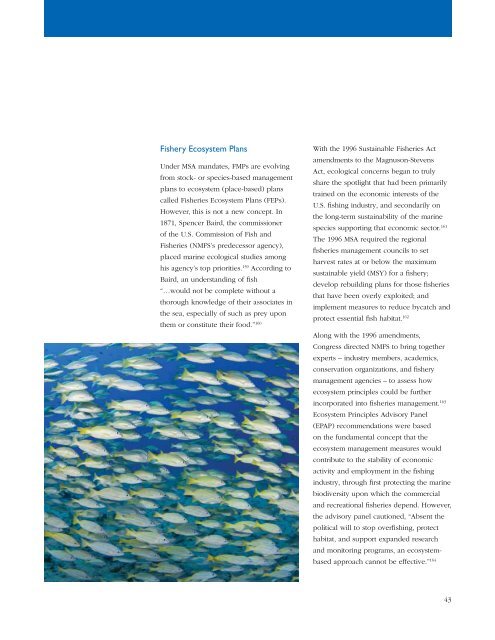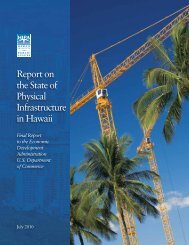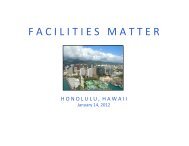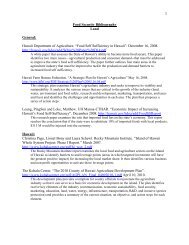Hawai'i Fisheries Initiative - The Hawaii Institute for Public Affairs
Hawai'i Fisheries Initiative - The Hawaii Institute for Public Affairs
Hawai'i Fisheries Initiative - The Hawaii Institute for Public Affairs
You also want an ePaper? Increase the reach of your titles
YUMPU automatically turns print PDFs into web optimized ePapers that Google loves.
Fishery Ecosystem Plans<br />
Under MSA mandates, FMPs are evolving<br />
from stock- or species-based management<br />
plans to ecosystem (place-based) plans<br />
called <strong>Fisheries</strong> Ecosystem Plans (FEPs).<br />
However, this is not a new concept. In<br />
1871, Spencer Baird, the commissioner<br />
of the U.S. Commission of Fish and<br />
<strong>Fisheries</strong> (NMFS’s predecessor agency),<br />
placed marine ecological studies among<br />
his agency’s top priorities. 159 According to<br />
Baird, an understanding of fish<br />
“…would not be complete without a<br />
thorough knowledge of their associates in<br />
the sea, especially of such as prey upon<br />
them or constitute their food.” 160<br />
With the 1996 Sustainable <strong>Fisheries</strong> Act<br />
amendments to the Magnuson-Stevens<br />
Act, ecological concerns began to truly<br />
share the spotlight that had been primarily<br />
trained on the economic interests of the<br />
U.S. fishing industry, and secondarily on<br />
the long-term sustainability of the marine<br />
species supporting that economic sector. 161<br />
<strong>The</strong> 1996 MSA required the regional<br />
fisheries management councils to set<br />
harvest rates at or below the maximum<br />
sustainable yield (MSY) <strong>for</strong> a fishery;<br />
develop rebuilding plans <strong>for</strong> those fisheries<br />
that have been overly exploited; and<br />
implement measures to reduce bycatch and<br />
protect essential fish habitat. 162<br />
Along with the 1996 amendments,<br />
Congress directed NMFS to bring together<br />
experts – industry members, academics,<br />
conservation organizations, and fishery<br />
management agencies – to assess how<br />
ecosystem principles could be further<br />
incorporated into fisheries management. 163<br />
Ecosystem Principles Advisory Panel<br />
(EPAP) recommendations were based<br />
on the fundamental concept that the<br />
ecosystem management measures would<br />
contribute to the stability of economic<br />
activity and employment in the fishing<br />
industry, through first protecting the marine<br />
biodiversity upon which the commercial<br />
and recreational fisheries depend. However,<br />
the advisory panel cautioned, “Absent the<br />
political will to stop overfishing, protect<br />
habitat, and support expanded research<br />
and monitoring programs, an ecosystembased<br />
approach cannot be effective.” 164<br />
43







